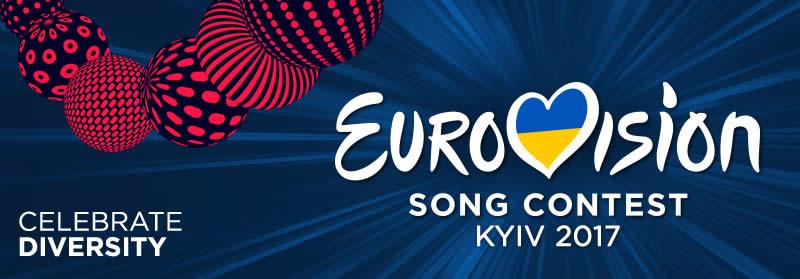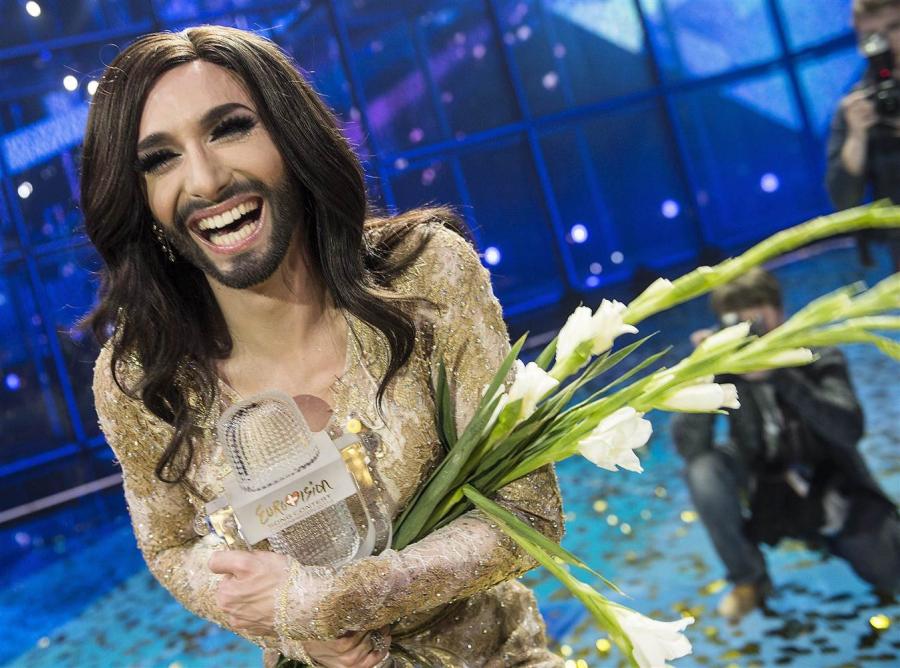
When the Eurovision song contest gets political: the start of a new era?
Leading up to the 62nd edition of the Eurovision Song Contest this May, we have seen traces of explicit political messages in various aspects of Eurovision and lenience in the upholding of the ‘no-politics’ rule towards participants. Eurovision should redefine its ‘no-politics’ rule and be stricter in upholding it, to ensure that the Eurovision Song Contest will not enter a new era in which the festival is primarily employed as an instrument for political goals.
What started out as a small-scale European song contest in 1956, has become a large annual tradition with 43 potential contestants, in which even non-European countries may compete. Moreover, with an average number of 180 million spectators per year – and live broadcasts not only in Europe but in various countries all over the world – Eurovision provides a uniquely large stage for artists from different cultural backgrounds to spread positive messages across borders.
Jamala’s performance in 2016 carried an implicit political message and can therefore be regarded as an artistic intervention of a political nature in a public sphere of debate restricted by a ‘no-politics’ rule.”
With access to a platform of this size, public figures can operate as critics and opinion-makers in the ‘public sphere of debate’ (Habermas, 1962). This can be done through so-called ‘artistic interventions’: political statements made through artistic performances. However, artists competing in the Eurovision Song Contest have less artistic freedom, because of rules that govern what type of acts are permitted in the contest. Eurovision claims that performances not only affect the image of the artist and the represented nation, but also the image of Eurovision and the European Broadcasting Union (EBU) that organizes it. One of the most widely discussed rules states that
“[n]o lyrics, speeches, gestures of a political or similar nature shall be permitted during the ESC. (…) No messages promoting any (…) political cause (…) shall be allowed in the Shows and within any official ESC premises (i.e. at the venue, during the Opening Ceremony, the Eurovision village, the Press Centre, etc.). A breach of this rule may result in disqualification.” (Eurovision, 2017).
This ‘no-politics’ rule places restrictions on what messages are allowed to be spread in the public sphere of debate in which the Eurovision Song Contest is embedded – but it is an arbitrary one. When are lyrics, speeches or gestures to be considered politically inspired? The presence of this 'no-politics' rule does not mean that the song contest is completely void of politics, but it helps maintain the unofficial intent of Eurovision to unify European nations in a friendly competition. Leading up to this years’ edition of the event, we can discern multiple traces of politics in various aspects of Eurovision, as well as a certain degree of lenience in the upholding of the ‘no-politics’ rule towards participants.
Especially those who are sceptical about Eurovision tend to mock the contest for being nothing more than a political game. If not for its unofficial and idealistic intent of unifying European nations in a friendly competition, then most certainly for the fact that for some countries the voting behaviour (of both the national jury and the tele-voting people) can already be more or less predicted before the entries to the competition are even revealed. Apart from voting behaviour, a political trend can also be discovered in the annual themes of the song contest that were introduced in 2002. Where initial themes in 2002 and 2003 were slogans such as ‘A Modern Fairy-tale’ and ‘Magical Rendezvous’ respectively, more recent themes have gained a more political undertone: ‘Building Bridges’ (2015) and ‘Come Together’ (2016). This year's theme ‘Celebrate Diversity’ (2017) is also a clear example of politics in Eurovision, because promoting a 'pro-diversity' stance is a political statement in and of itself.

Eurovision Song Contest Kyiv (Ukraine) 2017 logo with slogan: Celebrate Diversity
The political dimension of Eurovision's 'pro-diversity' stance was already demonstrated back in 2014. Sometimes it's difficult to maintain the ‘no-politics’ rule when a performance may not be politically inspired of itself, but others might still interpret it that way. When Conchita Wurst won Eurovision on behalf of Austria in 2014, international attention established her as a gay icon. It was considered by many to be a sneer at Eastern-European countries such as Russia – known for their intolerance towards homosexuality: “a vote for Wurst is another vote against Russian homophobia and transphobia, and a win would send out a strong message of defiance eastwards”.

Conchita Wurst poses with the trophy after winning the Eurovision Song Contest 2014 Grand Final in Copenhagen, Denmark, on May 10, 2014.
The arbitrariness of the ‘no-politics’ rule can also be seen in the performance of singer Jamala representing Ukraine last year. Her song called ‘1944’ lamented the Soviet deportation of more than 240.000 ethnic Tatars from Ukraine’s Crimea region under the Stalin regime during the Second World War. This performance did not go well with Russia. Russian officials complained that the song was intended to denigrate Russia, but the Geneva-based organisers of Eurovision decided that the song was not in breach of the competition’s rules against political speech. Even though the lyrics did not directly refer to Putin’s annexation of the Crimea region in 2014, Jamala did express to The Guardian that the song was a statement about that event as well, even before she won the Eurovision Song Contest shortly after. This artistic performance carried an implicit political message, and can therefore be regarded as an artistic intervention of a political nature in a public sphere of debate restricted by a ‘no-politics’ rule.
By allowing Jamala’s entry on behalf of Ukraine in 2016, Eurovision and the EBU visibly broke down a barrier that kept the song contest from becoming explicitly politically charged. While some traces of politics could already be found in the various aspects of Eurovision, the EBU Reference Group as its executive body has previously prevented smaller instances of politically inspired entries from participating. Why they decided upon allowing Jamala’s song, especially in the sensitive context of the recent annexation of the Crimea region by Russia, is difficult to understand. This shows the arbitrariness of the ‘no-politics’ rule and it exposes the lenience of the EBU Reference Group in upholding the rules regarding politicised speech and performance in the contest.
What's more, Eurovision could not sufficiently foresee any possible escalation of the tension between Ukraine and Russia within the contest. Russia’s entry for 2017, Yuliya Samoylova, was recently banned from entering Ukraine for three years for a violation of Ukrainian legislation back in 2015. Even though Eurovision tried to circumvent this ban by allowing for a live satellite broadcast of Samoylova’s performance on Russian soil during the show, Russia has already declined the offer and officially decided not to participate in this years’ Eurovision Song Contest.

Yuliya was due to sing in the semi-final to compete for a place in the grand final.
Unless Eurovision actively makes an effort to redefine and clarify their ‘no-politics’ rule, artistic interventions of a political nature will become a new trend in Eurovision. Additionally, the EBU Reference Group needs to find a stricter way of upholding the ‘no-politics’ rule regarding contestants. While it would be untrue to claim that Eurovision has kept the song contest completely free from politics over the years, a trend can be discovered that puts the ESC in danger of becoming explicitly politically charged. If the EBU Reference Groep does not intervene, a new era for Eurovision will soon arrive in which performances will be more often, and more openly, used in political strategies among nations to generate (or deteriorate) support for other nations. To ensure that the annual spectacle promoting European togetherness will not be primarily employed as an instrument for political goals, Eurovision and the EBU Reference Group need to speak out more clearly against politically inspired performances, speech and gestures. Otherwise the sceptics who mocked Eurovision for being nothing more than a political game will be right after all.
References
Calvocoressi, T. (April 28, 2014). Can a bearded Austrian drag queen give Putin the bird? New Statesman.
Eurovision Song Contest. (n.d.). Wikipedia – the free encyclopedia.
Eurovision Song Contest 2015 Grand Final. (n.d.). Eurovision Song Contest 2017.
Facts and Trivia. (n.d.). ‘The contest’. Eurovision Song Contest 2017.
Freeman, C. (May 15, 2016). ‘They kill you all’: why Ukrainian Eurovision winner, Jamala, angered Russia with her 1944 song. The Telegraph.
Habermas, J. (1962). The Structural Transformation of the Public Sphere: an inquiry into a category of Bourgeois society. Translated by Thomas Burger and Frederick Lawrence in 1989. Cambridge: Polity.
Halpin, C. (February 14, 2016). Ukraine: Is Jamala’s song “1944” too political for Eurovision 2016? Wiwibloggs.
Jordan, P. (January 30, 2017). Ukraine is ready to Celebrate Diversity in 2017. Eurovision Song Contest 2017.
NOS redactie. (March 23, 2017). Rusland kan meedoen aan Songfestival, via satellietverbinding. NOS.
Participants 2017. (n.d.). Eurovision Song Contest 2017.
Rules of the Eurovision Song Contest. (n.d.). ‘Rules in 2017’. Eurovision Song Contest 2017.
Stolworthy, J. (April, 15, 2017). Eurovision Song Contest 2017: Russia pulls out after singer banned from entering Ukraine. Independent.
Telegraph Reporters, Kiev. (May 15, 2016). Eurovision 2016: Furious Russia demands boycott of Ukraine over Jamala’s ‘anti-Kremlin’ song. The Telegraph.
The Story. (n.d.). ‘The successes’. Eurovision Song Contest 2017.
Walker, S. (May 13, 2014). Ukraine’s Eurovision singer urges voters to show Crimea solidarity. The Guardian.
Walker, S. (March 22, 2017). Ukraine bans Russia’s Eurovision entrant over Crimea tour. The Guardian.